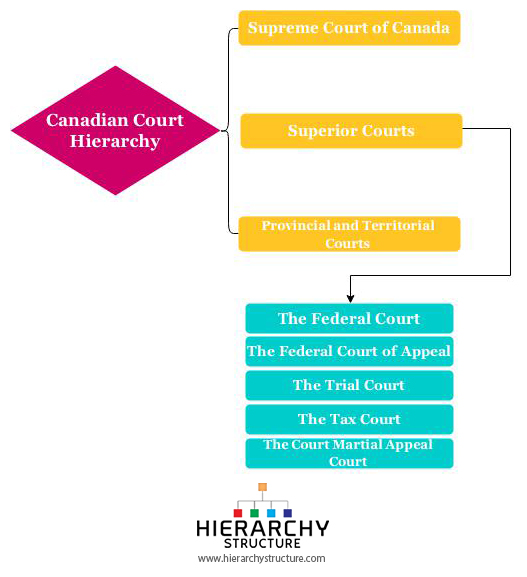The court system in Canada consists of many courts which are placed at different levels of jurisdiction and legal superiority. While some of these courts are of federal nature, others function at state or territorial level. The federal courts have exclusive rights over criminal law whereas the provincial courts have exclusive rights over civil law.
Due to this variance in the roles and responsibilities, there is a hierarchical system or structure that is formed. This is known as Canadian court hierarchy and broadly speaking, there are 4 major hierarchical levels from highest to lowest, as shown below.
Supreme Court of Canada
The Supreme Court of Canada is the highest court in the country and consists of 9 justices including the Chief Justice of Canada and Eight Puisne justices. Some of the duties of the Supreme Court include hearing appeals of decisions from the Appellate courts, delivering references on constitutional questions etc.
Superior Courts
Every territory as well as province in Canada has two levels of Superior Court, where one hears trials and the other hears appeals. The superior courts in the country handle divorces, criminal offences, civil cases that involve large sums of money as well as review of decisions in administrative and lower courts.
- The federal court-handles cases and appeals from decisions of federal tribunals.
- The federal court of appeal-handles cases that arise under federal laws.
- The trial court-is known by many names in different provinces.
- The tax court-handles cases of dispute between tax payers and the federal government.
- The court martial appeal court- this court hears appeals from Canadian military courts.
The judges appointed on each of these superior courts are also eligible to become members of the Canadian Superior court judges administration.
Provincial and Territorial Courts
Each of the provinces as well as the territories in Canada appoint as well as pay the judges who work in the courts which form the lower tier of the entire court legal system of Canada. These courts have the responsibility and the power to deal with criminal offences with the exception of murder cases. They handle the violations of the provincial laws as well.
There are small claims courts which are established in several provinces and territories to resolve and handle civil actions that involve small sums of money. There are also special courts called youth courts which handle or deal with cases involving young people between the ages of 12 and 18 who are charged with criminal offences.

